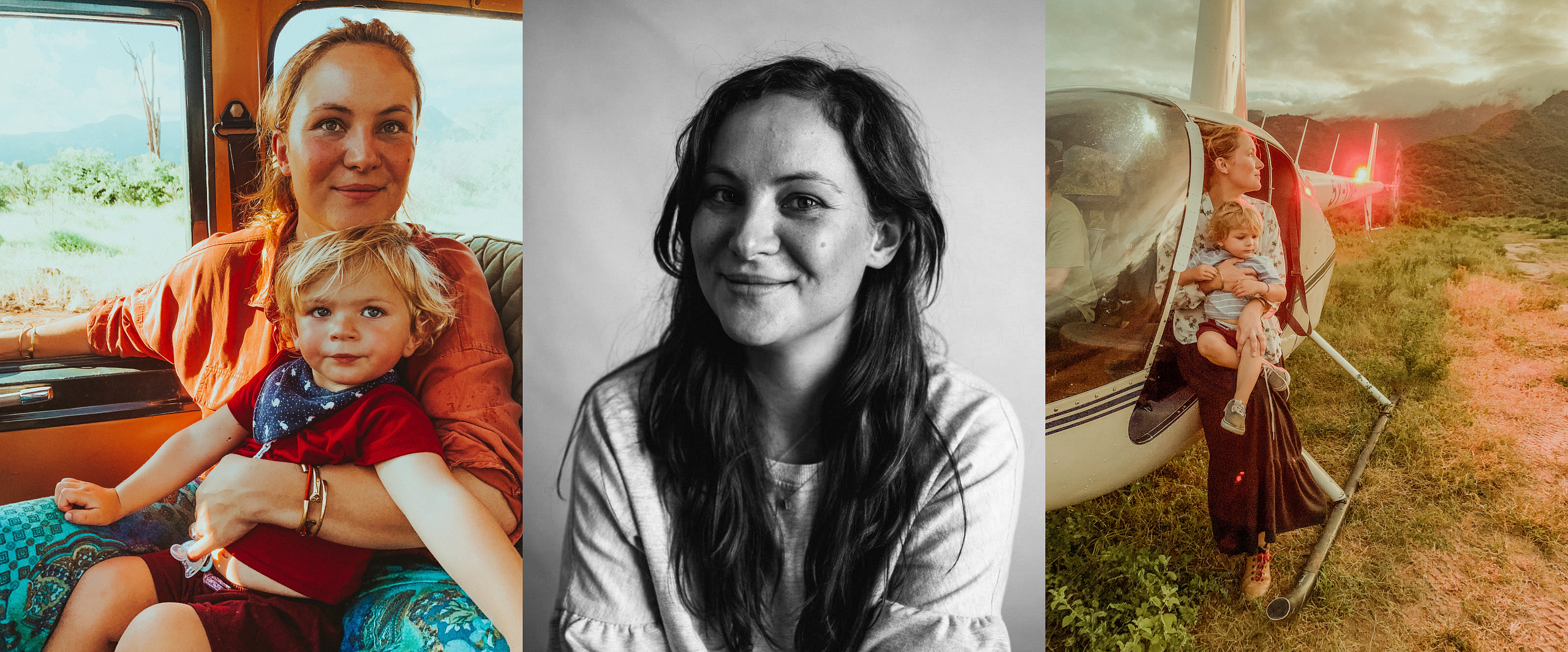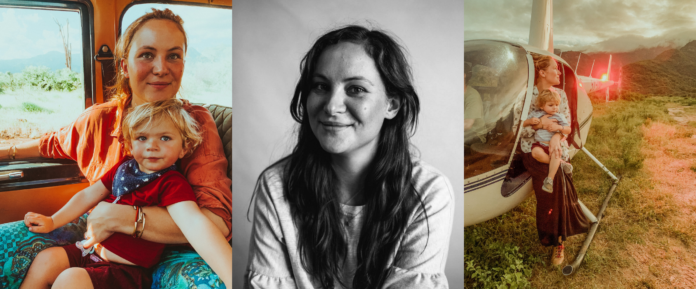Social Impact Heroes: Why & How Sam Suter of The Matriarchs Decided To Change Our World

The Matriarchs is all about sharing the stories of women from different backgrounds, working to create change, inspire and empower others, raise critical awareness, and inspire hope. In sharing these stories through films, photography and powerful blog posts, we hope to make a difference both in the environmental and humanitarian space. We are lifting women up to fulfill their purpose and helping those that are already leading the way to do more — to support them and champion them.
As a part of our series about “Filmmakers Making A Social Impact” I had the pleasure of interviewing Sam Suter.
Sam Suter, is the Founder of The Matriarchs, which produces films focused on women doing incredible work in the environmental and humanitarian space. Sam’s creativity and her passion for human-empowerment and wildlife conservation shows in her work and the content that The Matriarchs create. She believes that through film we can shed light on issues that need to be addressed and talked about — on people doing remarkable work — and create real change by sharing these stories and connecting people across the world.
Thank you so much for doing this interview with us! Before we dive in, our readers would love to get to know you a bit. Can you share your “backstory” that brought you to this career?
I worked in Kruger National Park for Singita, a private lodge that focuses on conservation. I was the HR Manager for years, and my now husband was a Game Ranger. Both of us had a passion for the natural world and people. My husband along with gifted cinematographer, Oli Caldow, started Black Bean Productions — filming wildlife and lodges. I eventually joined them as a Director of the company.
We have done a range of work — from commercials to mini-documentaries and social media campaigns with a call to action. I have worked with several international NGOs and conservation & humanitarian organizations. In 2017 I had my first child, and when he was roughly three months, I found myself having a newfound respect and love for women. We had
met so many women over the years filming in remote areas, all over Africa and in cities. So often these women didn’t make the final cut of our films or their stories weren’t the focus of the work we were commissioned to do. The Matriarchs would let us share those stories of women doing amazing things.
Can you share the funniest or most interesting story that occurred to you in the course of your filmmaking career?
I took our then eight-month-old son to Namibia with us to film. Myself, our videographer and my husband were all staying at an animal sanctuary called REST. That day we got to hear all about the founder Marie and her incredible journey. In the evening she commented that not only would I be up that night breastfeeding my son, but she would also be up with a newly rescued 4-week old pangolin — feeding her through the night to keep her alive. She had a pangolin in one hand, a meerkat over her shoulder and a cup of tea. A moment I’ll never forget.
Who are some of the most interesting people you have interacted with? What was that like? Do you have any stories?
At least 70% of The Matriarchs filming has been in remote parts of Africa. From meeting different tribes, like the Maasai and the Himba, to the guardians of the last remaining northern white rhinos on earth — there have been so many that have touched my heart and left me inspired.
I spent time with the strong and dedicated women of the Black Mamba anti-poaching unit — the first all-female anti-poaching in the world. I loved interviewing them about their perseverance through training and being in the Bush patrolling while lions, elephants and rhinos romaed.
What are some of the most interesting or exciting projects you are working on now?
Over the last few months, we have started focusing on women working to address humanitarian issues as well as environmental issues. We are sharing the stories of young girls who have overcome hardships and issues like poverty and gender-based violence. We interviewed an NGO, BRAVE, that is girl-led and focuses on empowering other girls in similar situations.
We are also excited to be focusing on some issues like gender-based violence, child marriage, climate change, poor access to education and the refugee crisis, and how these issues impact women and young girls.
Which people in history inspire you the most? Why?
Both Jane Goodall and Dian Fossey for their adventurous spirit, love of wildlife and absolute passion and determination when it came to their work with Great Apes which is remarkable and inspiring. I often find myself wondering if I could have lived out in the wilderness like that for a cause l believed in.
Let’s now shift to the main focus of our interview, how are you using your success to bring goodness to the world? Can you share with us the meaningful or exciting social impact causes you are working on right now?
The Matriarchs is all about sharing the stories of women from different backgrounds, working to create change, inspire and empower others, raise critical awareness, and inspire hope. In sharing these stories through films, photography and powerful blog posts, we hope to make a difference both in the environmental and humanitarian space. We are lifting women up to fulfill their purpose and helping those that are already leading the way to do more — to support them and champion them.
Through hearing from women and sharing these stories — we’re building a global community that empowers one another, helps one another and that changes women’s mindsets — to always believe in themselves and their abilities.
Many of us have ideas, dreams, and passions, but never manifest it. But you did. Was there an “Aha Moment” that made you decide that you were actually going to step up and take action for this cause? What was that final trigger?
My ‘aha moment’ happened over time as I spoke to women on the ground, heard their struggles and heard about how they were limited because they were women. Hearing how they weren’t recognized and how hard it was for them to garner support — made me want to do the project no matter what. Enter The Matriarch — I had to film and share these words because these women deserve to be heard, to be helped and to be remembered one day.
Can you tell us a story about a particular individual who was impacted or helped by your cause?
We featured an incredible female Guide in Uganda who works with the Chimpanzees of Kyambura Gorge called Ruth. She is a beautiful and outgoing woman — so passionate and knowledgeable about her work and chimpanzees. She was one of our Matriarchs, and someone saw her film and blog and booked a trip to Africa and asked for her to be their Guide in this part of Uganda. They specifically requested ‘Ruth from The Matriarchs’, and this just made her day. It really was amazing for us too!
Are there three things that individuals, society or the government can do to support you in this effort?
⁃ Join our community and share our Matriarchs stories. There is so much power in sharing, engaging, helping to raise awareness around the issues our Matriarchs are fighting for.
⁃ Learn more about the causes our Matriarchs represent and help support them by donating, volunteering or supporting sustainable tourism
⁃ We all have an important role to play in the fight for gender equality and women empowerment. It’s important to remember that your voice and how you use it matters, the causes you support and speak out for matter, so always try to be a catalyst for positive change.
What are your “5 things I wish someone told me when I first started” and why. Please share a story or example for each.
1. Agreements and putting things in writing is so important
2. The more linking shots, the better. The edit is so much more powerful if the narrative flows, and is strong and clear.
3. Have a distribution plan first. Almost go backwards and work from “where and who and how are people going to watch this”.
4. Connect with the people you are filming on a deep level and try to tell their story like no one ever has or like no one ever will.
5. Being a filmmaker in South Africa is challenging. Film production is expensive and to make a sustainable business out of it, especially if you are filming cause-related work, is incredibly hard.
If you could tell other young people one thing about why they should consider making a positive impact on our environment or society, like you, what would you tell them?
Don’t be afraid to do what hasn’t been done before and don’t give up. Especially as a woman, there are often so many unnecessary limitations.
The second thing that’s often harder to remember is that sometimes change is slow and it usually happens one person or life at a time, and that’s okay.
We are very blessed that many other Social Impact Heroes read this column. Is there a person in the world, or in the US, whom you would like to collaborate with, and why? He or she might see this. 🙂
Lupita Nyongo because she is someone I have looked up to for a while now. I just find that (even though I do not know her) there is something so real and humble about her, almost like a realness that’s hard to keep or to exude when you are that famous. I love the projects she chooses to focus on.
Can you please give us your favorite “Life Lesson Quote”? Can you share how that was relevant to you in your life?
“There is no song louder than love.”
So much of the work we do and the stories we tell are so deeply rooted in love. Love for people, love for the natural world and love for helping others. It’s a huge driving force and fuels our passion.
How can our readers follow you online?
Follow us on Instagram: https://www.instagram.com/the_matriarchs/
Join our community: https://thematriarchs.org/blog/
This was great, thank you so much for sharing your story and doing this with us. We wish you continued success!


